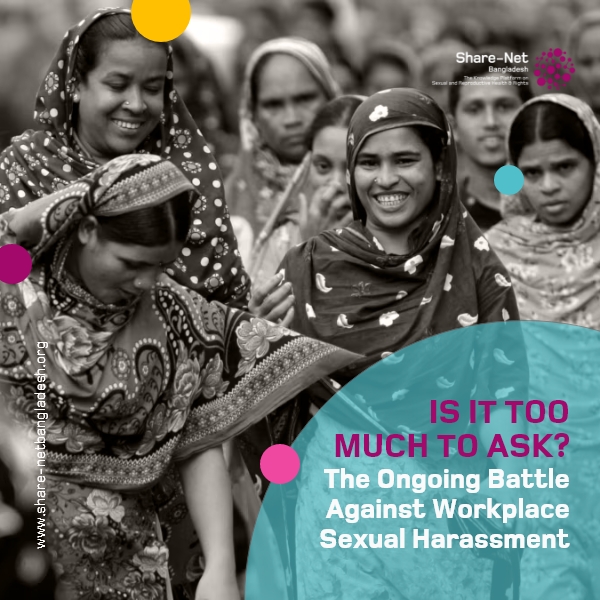Is It Too Much To Ask? The Ongoing Battle Against Workplace Sexual Harassment
“78 percent of women face sexual harassment in Dhaka city workplaces, roads, and transports,” reveals a recent study. Despite significant progress in women’s economic empowerment, sexual harassment remains a major obstacle for working women in Bangladesh, highlighting critical issues in Sexual and Reproductive Health and Rights (SRHR).
Faiza Islam, a recent graduate from Jagannath University, experienced this firsthand. Excited about her new role as a programme officer at an NGO, her enthusiasm was quickly shattered. On her first day, the managing director addressed her as “sweetheart,” a term she found inappropriate and shocking. Feeling disrespected and uncomfortable, Faiza left the job that very day.
Similarly, Ripa Dey, a long-time employee at a shoe factory, faced harassment from her new manager, Rafiqul Ahmed. Called into his office, she narrowly escaped an abusive situation, highlighting the pervasive nature of sexual harassment in various industries.
Despite women contributing significantly to Bangladesh’s economy—accounting for 34 percent of the GDP—their safety in workplaces is still compromised. Around 18.4 million women are part of the labor market, yet many remain vulnerable to harassment and abuse. This issue not only affects their sexual and reproductive health but also their mental well-being and economic stability.
In the garment sector, which employs a large number of women, only 2.2 percent report sexual abuse. The reluctance to report stems from fear of retaliation and the lack of effective mechanisms to address complaints. Many women choose to leave their jobs instead, further hampering their economic empowerment and career growth.
Human rights activist Monowara Haque emphasizes that sexual abuse is a criminal offense. In 2009, the High Court of Bangladesh mandated every workplace to establish a committee to handle complaints of sexual harassment, ensuring confidentiality and fair trials. However, the implementation of this policy remains inconsistent, with many offices lacking such committees.
Mahmudur Rahman, another human rights advocate, asserts that strict enforcement of the High Court order and heightened awareness about sexual harassment can significantly reduce these incidents. Ensuring a safe workplace is crucial for achieving Sustainable Development Goals (SDGs), particularly those related to gender equality (SDG 5) and decent work (SDG 8).
For Bangladesh to continue its progress from a Least Developed Country to a developing nation, protecting women’s rights at work is essential. The fight against sexual harassment must be a priority, requiring collective efforts from the government, organizations, and society. Only then can women fully contribute to and benefit from economic growth, ensuring a more equitable and prosperous future for all.
Addressing sexual harassment is not just about protecting individual rights; it is about fostering an inclusive environment that supports the health, dignity, and productivity of all workers. By upholding SRHR and promoting gender equality, Bangladesh can strengthen its workforce and achieve sustainable development.

